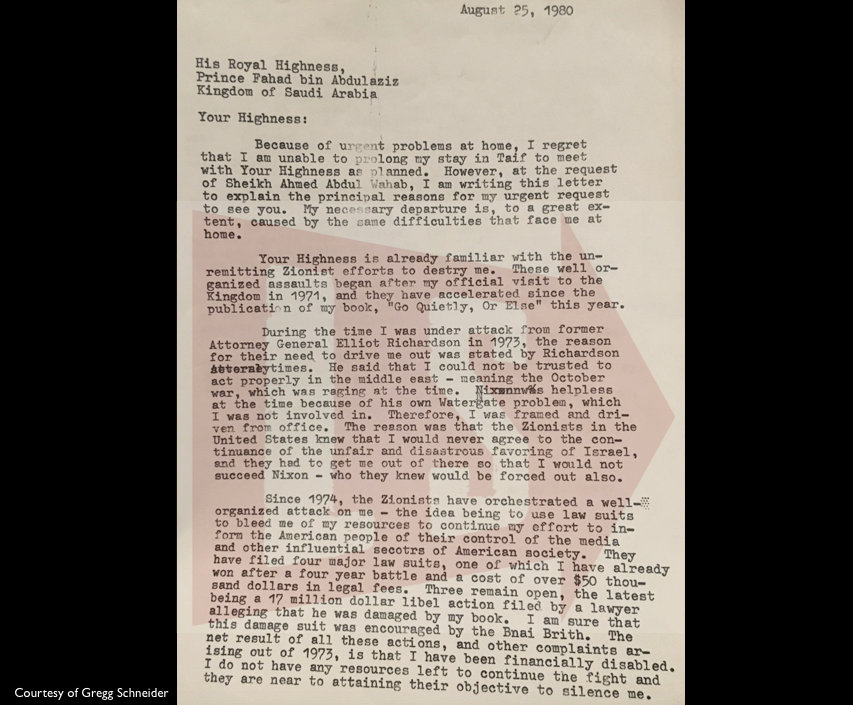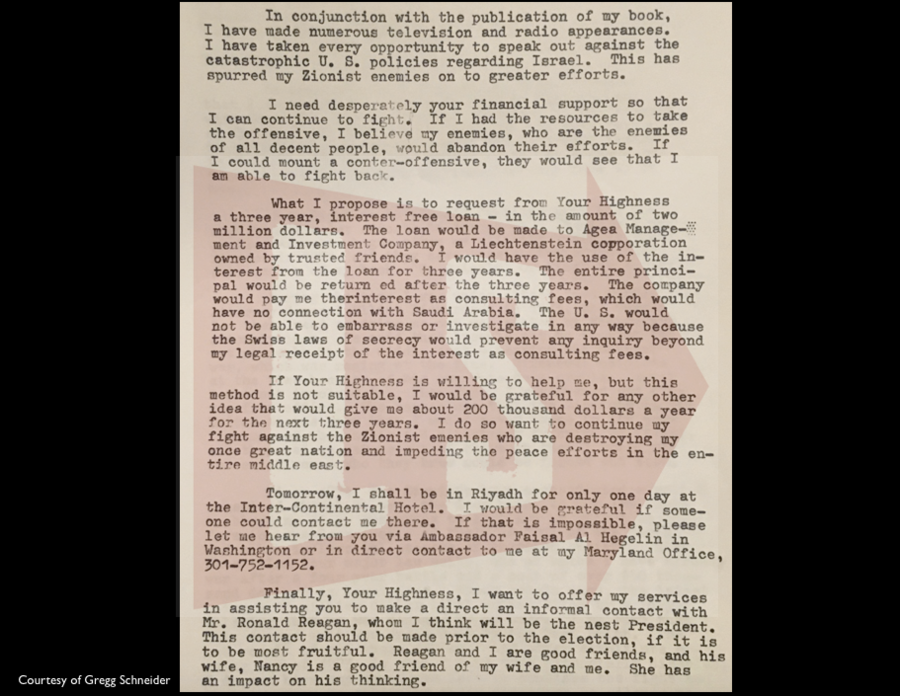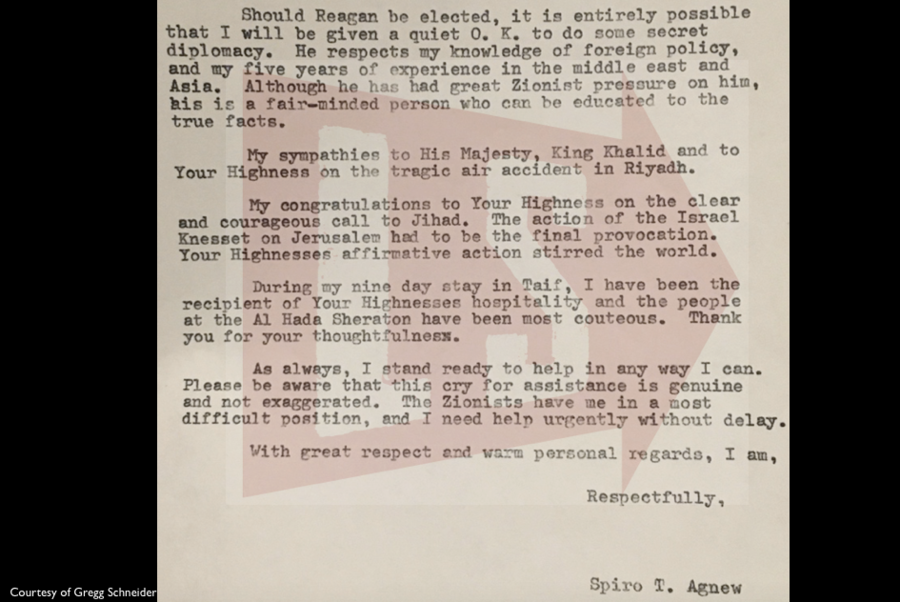Former U.S. Vice President Spiro Agnew congratulated an Arab leader for declaring a holy war against Israel and promised to help him influence President Ronald Reagan in a letter asking for millions of dollars to be funneled into a secret bank account for his use, according to a previously-unseen letter obtained by Lead Stories. (Read the full letter below)
Agnew praised Saudi Crown Prince Fahd bin Abdul Aziz for his "clear and courageous call to Jihad" in August 1980, which was a response to Israel declaring Jerusalem as its capital days earlier.
"My congratulations to Your Highness on the clear and courageous call to Jihad," Agnew wrote. "The action of the Israel Knesset on Jerusalem had to be the final provocation. Your Highnesses affirmative action stirred the world."
It's no historical secret that Agnew, who likely would have become the U.S. president had he not resigned as vice president in a kickback scandal in 1973, earned commissions for helping American businesses land Saudi contracts in the mid-1970s, but letters found in Agnew's private papers by collector Gregg Schneider reveal how he used anti-Israeli sentiment for profit.
Agnew told Prince Fahd, who was running Saudi Arabia at the time and would become king two years later, "the Zionists" forced him from the vice presidency because they feared he would succeed Richard Nixon, who resigned the presidency in August 1974 amid the Watergate scandal. Agnew said U.S. Attorney General Elliot Richardson told him about the Jewish conspiracy "to drive me out."
"He said that I could not be trusted to act properly in the middle east -- meaning the October war, which was raging at the time. Nixon was helpless at the time cause of his own Watergate problem, which I was not involved in. Therefore, I was framed and driven from office. The reason was that the Zionists in the United States knew that I would never agree to the continuance of the unfair and disastrous favoring of Israel and they had to get me out of there so I would not succeed Nixon - who they knew would be forced out also."
Agnew pleaded for immediate financial help from the Saudi Royal family, complaining that "Zionists have orchestrated a well-organized attack" that "bleed me of my resources to continue my effort to inform the American people of their control of the media and other influential secotors (sic) of American society."
The disgraced vice president said he had become "financially disabled" and "I do not have any resources left to continue the fight and they are near to attaining their objective to silence me."
Agnew offered a money-laundering scheme that would allow him to reap $200,000 a year for the next three years, enough for him to "mount a counter-offensive" against the Zionists.
"What I propose is to request from Your Highness a three year, interest free loan - in the amount of two million dollars. The loans would be made to Agea Management and Investment Company, a Leichtenstein corporation owned by trusted friends. I would have the use of the interest from the loan for three years. The entire principal would be returned after the three years. The company would pay me the interest as consulting fees, which would have no connection with Saudi Arabia. The U.S. would not be able to embarrass or investigate in any way because the Swiss laws of secrecy would prevent any inquiry beyond my legal receipt of the interest as consulting fees."
If Prince Fahd didn't like that route, Agnew said he was open to "any other idea that would give me about 200 thousand dollars a year for the next three years."
"I do so want to continue my fight against the Zionist enemies who are destroying my once great nation and impeding the peace efforts in the entire middle east," Agnew wrote.
Agnew then offered "my services" as a direct informal contact with Ronald Reagan, who was then three months away from being elected president.
"This contact should be made prior to the election, if it is to be most fruitful. Reagan and I are good friends, and his wife, Nancy is a good friend of my wife and me. She has an impact on his thinking."
"Should Reagan be elected, it is entirely possible that I will be given a quiet O.K. to do some secret diplomacy. He respects my knowledge of foreign policy, and my five years of experience in the middle east and Asia. Although he has had great Zionist pressure on him, his (sic) is a fair-minded person who can be educated to the true facts."
He closed by offering his congratulations for Prince Fahd's declaration of a holy war on Israel.
Prince Fahd apparently granted Agnew's wish. Agnew sent him a "thank you" letter on September 16, 1980.
"It is difficult for me to find the right word to adequately express my gratitude for the prompt response from Your Highness to my urgent communication left in Taif. When one is under steady attack from relentless enemies and false friends turn aside, one learns the rarity and value of true friends. That Your Highness, despite enormous pressures on him, has the compassion and can take the time to assist an old friend in time of crisis is evidence that the true spirit of Islam is not only preached but practiced by the Saudi Royal Family."
Agnew's private papers also include a reply from Prince Fahd.
"It is indeed my pleasure to express to you my gratitude for the sincere and friendly feelings you have shown," Prince Fahd wrote. "I truly appreciate your genuine concern in enhancing the cordial relations that exist between us, and which we strive for its further development with our sincere friends."
Eight years later, he got a boost from Vice President George H.W. Bush, who was weeks away from being elected president when he sent a letter to King Fahd on Agnew's behalf. For that, read: History Uncovered: Secret Letter Shows How Presidency Can Profit Friends
Dr. Salim Yaqub, a University of California-Santa Barbara history professor, explored Agnew's business dealings with the Saudis in his just-published book Imperfect Strangers: Americans and Arabs in the 1970s.
"In a nutshell, from 1974 on he ran an international consulting firm devoted to helping companies win contracts with foreign governments," Dr. Yaqub told Lead Stories. "Although I believe Agnew was sincere in opposing Israeli policies, he tried to turn those views to his own business advantage. In 1976, he encouraged the Saudi government to reward his anti-Israeli efforts by funding them directly and by awarding contracts to his clients."
Yaqub said the newly-found Agnew letters were "considerably more urgent" than earlier correspondence with the Saudis that he found while researching his book.
Read the three pages Agnew sent to Prince Fahd on August 25, 1980:
Also see: History Uncovered: Secret Letter Shows FBI Director Using Leaks To Target Political Opponent
Two years after Lead Stories exclusively reported on these documents, MSNBC host Rachel Maddow presented them in her show. Maddow, however, incorrectly stated the documents has never been published -- as Lead Stories did so in November 2016.


















